
by Dharam CW2 | Apr 30, 2024 | Project Management
Stakeholder Relationships
In project management, having strong relationships with stakeholders is critical to success. As someone who has mentored thousands of PMP, PgMP, and PfMP professionals, I have seen firsthand how strategic stakeholder engagement can transform project outcomes.
Ways to approach Stakeholder Relationships
Below are some essential strategies for building and maintaining these crucial relationships:
1. Map the territory: Understand the stakeholder hierarchy and create detailed profiles for individual and group stakeholders.
2. Design relationship pathways: Use relationship maps to illuminate interactions, thereby ensuring timely and effective communication.
3. Consistency and integrity: Always interact with professionalism and authenticity, building trust through reliability and ethical behavior.
4. Meet and exceed expectations: Foster trust and bolster confidence by managing and surpassing stakeholder expectations, committing to your promises, and maintaining transparency.
5. Support to succeed: Focus on how you can support stakeholders in ways that benefit project goals, enhancing mutual success.
Let’s share our ideas on personalizing our approach to stakeholder management and take our projects to new heights of success.
🚀 Elevate Your Project Management Career:
– Register for my upcoming PgMP/PfMP Success Story Webinar: https://bit.ly/3TSx8fj
– Book an obligation-free consultation session on Project management Career, training, and certifications: http://talktodharam.com
– Discover training offers and certification discounts: https://bit.ly/3jWVepD
– Stay updated with our Q&A series and certification success stories by subscribing to the vCare Project Management YouTube channel at https://bit.ly/2YF0wJl
– Follow my podcasts and interviews with Project Management Experts on YouTube at https://bit.ly/2NDY8wd
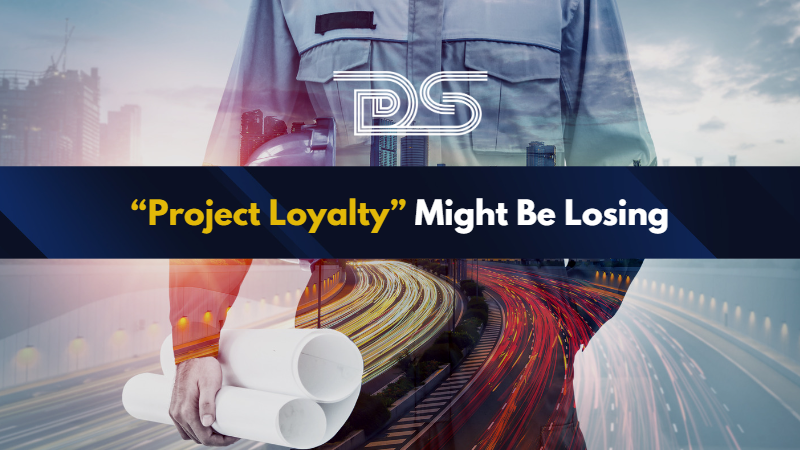
by DharamCW | Feb 24, 2023 | General
To be successful in project management, professionals must adhere to specific values like honesty, responsibility, respect, and fairness, which are central to the project management profession and are encompassed by ethics in project management. Therefore, understanding these values and how to apply them is essential for working in project management.
Ethics is important in day-to-day interactions and behaviors in the project management world. “Ethics is about making the best possible decisions concerning people, resources, and the environment,” according to the PMI (Project Management Institute). Ethical decisions can reduce risk, advance positive outcomes, build trust, determine long-term success, and build reputations.
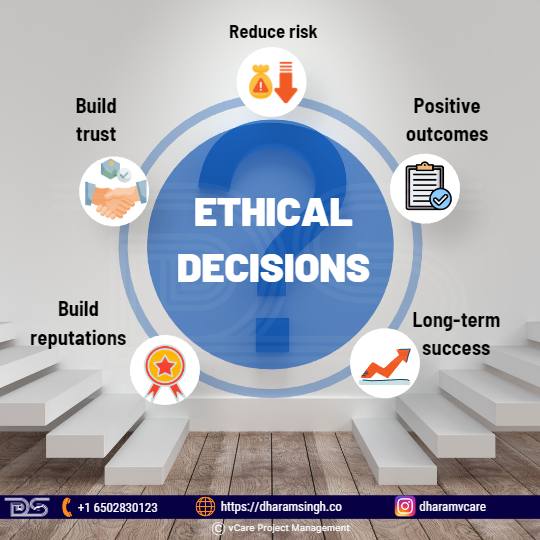
Ethical Decisions
Corporate leaders are responsible for ensuring that their employees practice ethics in the workplace. Failing to follow ethics might result in numerous scandals. The project manager must ensure that all projects are managed and executed efficiently and ethically. If a project manager is ethical, they can influence the project team to work ethically and ensure that all project work is done ethically.
PMI has identified four values for ethical behavior in the project management profession, which can be applied amongst project team members to maintain project loyalty and ethics.
Honesty: Be genuine in your communication and behavior
Responsibility: Take responsibility for your decisions and actions and the consequences that result from them.
Respect: Admire yourself, others, and the resources entrusted to you, such as people, money, and reputation.
Fairness: Decisions and actions should be unbiased, and behavior should be free of favoritism, self-interest, and prejudice.
Therefore, project management professionals must follow the Project Management Institute’s (PMI) Code of Ethics to ensure that all decisions taken are in the best interests of stakeholders and the project team.
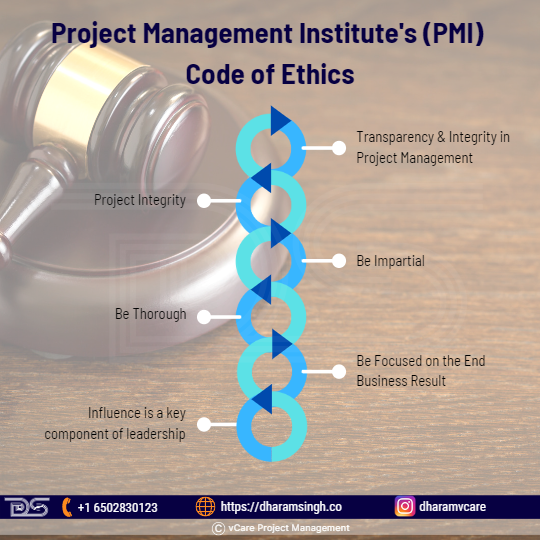
Project Management Institute’s (PMI) Code of Ethics
Transparency & Integrity in Project Management
Project management transparency characterizes a team’s open communication and visibility culture. Information in project management is on a need-to-know basis and is not readily available to everyone. A lack of transparency can lead to resentment or even distrust within the team. Transparency can advance a manager’s career, but it can harm the project manager’s reputation and career if carried out improperly. Therefore, there are many facts to believe that project managers should place a high value on openness and honesty.
The project manager’s transparency can lead to:
- Better performance and accountability
- Eliminates project derailment
- Enhancing teamwork
- Make sure people understand their tasks.
- Communicate openly and explain changes
- Provide and encourage feedback
- Promote knowledge-sharing
- Increase visibility with the right tools
- Focus on project budget
Project Integrity
As a project manager, acting with integrity with other project team members entails being open and honest about their expectations, intentions, and thoughts on their work. In addition, one must have the integrity to make the project team complete the project on time, within budget, and within the project’s scope.
Here are suggestions for acting with integrity with team members:
Be Impartial:
- Be objective and fair.
- Listen to both sides of the tale and different points of view without becoming attached to one in particular due to prejudice or favoritism.
- Rather than patching problems, objective decision-making fleshes them out and allows teams to get to the bottom of them.
Be Thorough:
Complete tasks entirely and thoroughly and validate the steps against a project management methodology of choice. This action ensures that a much more comprehensive project management plan and supporting documentation are created.
Be Focused on the End Business Result:
Regardless of when team members are introduced into the team, they should confirm initial business requirements and the work requested within the scope of their project role. This process enables them to provide their input based on their subject matter expertise, increasing the likelihood of project success.
Influence is a key component of leadership
To influence means to impact other people’s behavior, opinion, and choice. Influence is not the same as power or control. Instead, it is about recognizing what motivates employee commitment and applying that knowledge to boost performance and positive outcomes. The ability to influence others is a necessary leadership trait.
A leader’s ability to influence others is founded on trust; the project manager’s influence grows directly to the level of trust in a relationship. An effective leader motivates team members to act not through coercion but by eliciting their desire and conviction in the leader’s vision and goals. A leader who positively influences others through focused and deliberate effort will gain trust and become a driving force toward excellence.
Let’s look at how leaders can effectively build trust and influence with others.
- Establish credibility
- Engage with team members and build a connection
- Clarify expectations and practice accountability
- Share process knowledge
- Be open to influence
Relationship between stakeholders and project manager to maintain trustworthiness
Communication accounts for up to 90% of a project manager’s job. Conflicts can arise, and projects can fail if there is ineffective communication within the project team. Transparency in the project requires open, two-way communication with stakeholders about the status of a campaign. It keeps clients and stakeholders informed of campaign developments and other project activities.
Why is transparency important for stakeholders?
Transparency is essential in a client-facing project for one simple reason: it fosters trust. When project leader gains the trust of their stakeholders, they are more likely to gain their cooperation and guidance. Maintaining positive stakeholder relationships requires trust, and project stakeholders’ importance cannot be overstated. The support of the stakeholders is critical for project success.
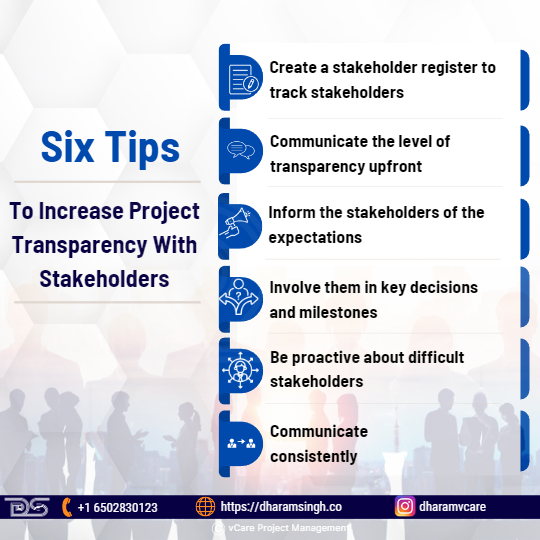
Six Tips To Increase Project Transparency With Stakeholders
Six tips to increase project transparency with stakeholders
- Create a stakeholder register to track stakeholders
- Communicate the level of transparency upfront
- Inform the stakeholders of the expectations.
- Involve them in key decisions and milestones
- Be proactive about difficult stakeholders
- Communicate consistently
Digital Transformation’s Impact on Project Management
Project managers have continued to manage project planning, acquisition, and execution, but their work is evolving with digital transformation.
Most project managers have already incorporated workflow and process automation technology in a few specific areas, like reporting and scheduling. And the majority of them are using digital platforms for project management which can help them stand separate.
How does a project manager acquire the knowledge and experience necessary to lead a digital transformation? What qualities are essential for this type of leader?
PMI’s 2018 Pulse in-depth report ‘Digital PM Skills’ survey conducted by Forrester Consulting for PMI among HR professionals and project managers and identified the top 6 digital-age skills required to get adapted in the digital transformation, like:
- Data science skills
- Innovative mindset
- Security and privacy knowledge
- Legal and regulatory compliance knowledge
- Ability to make data-driven decisions
- Collaborative leadership skills
Cybersecurity’s impact on projects
Project management and the need to establish objectives that protect information security are necessary for today’s project management world. Organizational fragility and vulnerability have increased due to digital transformation, and the proliferation of data and information has become abundant, so it is necessary to safeguard the data from getting misused. Therefore, many businesses are incorporating new elements into their projects to protect their information’s vulnerability, like:
- Security Plan: For the project’s security, a project leader must be aware of the risks to be addressed to develop a security plan. Taking them into account will help them chart the course of the plan and focus on the project’s objectives.
- Business requirements: The project manager must understand the project’s security requirements and business objectives to ensure its completion and success.
- Responsibilities: Each team member should be clear about their responsibilities in terms of security. The well-known RACI (Responsible, Accountable, Consulted, Informed) responsibility assignment matrix is used by many project managers, which aids in ensuring that project objectives are met.
- Security by design: Information security must be considered from the start of a project and throughout the process. Automating processes will improve project success and builds project security.
Pointers to incorporate cybersecurity in project management:
- Determine the project’s sensitive information.
- Evaluate the members’ responsibilities.
- Implement a level of information sensitivity.
- Understand security standards and regulations.
- Include security goals in the project’s objectives.
- Determine the company’s legal responsibilities to the information.
Technology vs. Ethics
Every facet of an organization disrupted by technology shows a possibility of gaining or losing stakeholders’ confidence and commitment. Technology advances can easily outrun the ethical standards that govern their application. Technology’s impact on project ethics is progressing similarly, with employers establishing ethical boundaries that violate employee privacy rights and limit communication abilities.
Some of the technology’s impact on project ethics
- Monitoring Team’s Communications
Project team leaders have monitored employees’ communications during working hours to keep employees focused on work tasks. In addition, because of digital technology and Internet access, there are more chances that project team members can get diverted and utilize the facilities in their personal activities.
The changing definition of the workplace impacts the ethics that underpin the traditional eight-hour work time. It is not ethical simply because technology allows project leader to access their employees and request work at any time. Increasing the working hours to nearly more than their actual hours also blurs the ethical lines in employee compensation.
Employees with restricted access to company property, such as a cell phone or personal computer, may treat it as personal property. An ethical issue may arise when an employee uses office property for non-work-related activities, such as looking for a new job or making personal calls. An employer must establish a clear policy regarding using company property loaned to an employee for business purposes only. This policy enables an employer to develop an ethical standard for using technology.
Ethical Decision Making in Project Management
Decision-making in project management is essentially a great reminder to project success. A truly accomplished project leader inspires, motivates, and builds a strong group that aids their team objectives. The concept of ethical decision-making has also been a focal point in improving project decision-making.
The ethical decision-making process and its roadmap
Every day, a project manager might make thousands of decisions and can come up with the best solution within nanoseconds of hearing about a problem. However, managers must regularly make major decisions incorporating more diligence, forethought, and collaboration with their colleagues. The failure in decision-making can create severe implications and chaos. Thus, organizational performance depends on good decision-making.
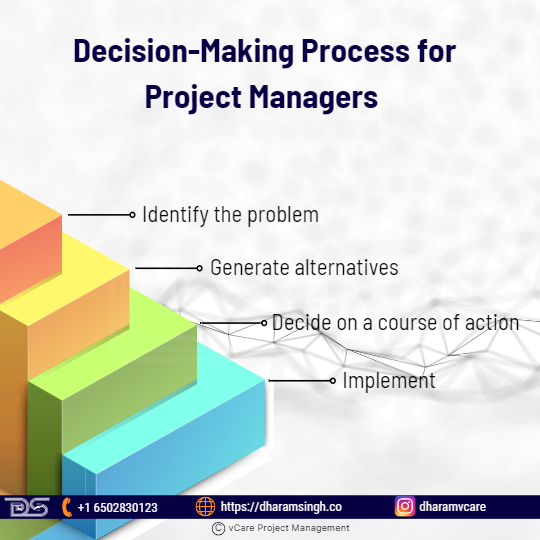
Decision-Making Process for Project Managers
Four steps that can comprise a basic framework for project managers’ decision-making process are:
1) Identify the problem
2) Generate alternatives
3) Decide on a course of action
4) Implement
Ethical Dilemmas in Project Management
The bigger the project, the greater the potential for people or businesses to compromise their moral standards to finish the project on schedule and within budget. The outcomes of project managers and other stakeholders ignoring debatable activity are disastrous, like blown budgets, legal concerns, and even criminal charges, which are too frequent in today’s project environment. Moreover, many businesses are aiming for 100% automation and implementation in the project management process. The project managers need to take charge of these initiatives, which might result in ethical dilemmas involving stakeholders, technology, or communities.
Ethical dilemmas arise when circumstances contradict the project manager’s professional standards or moral values. The project managers must ensure that a project fulfills its social responsibility and well-being commitments by keeping its long-term goals in mind.
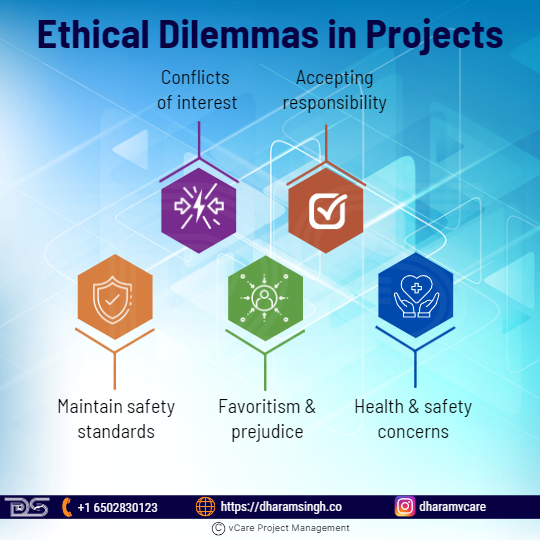
Ethical Dilemmas in Projects
Some Ethical dilemmas in projects include
- Conflicts of interest
For project managers, conflict of interest is a major ethical concern. A conflict of interest occurs only when an individual or group has multiple interests in a project, which may hinder the integrity of the process.
- Accepting responsibility
When a project goes wrong, managers may be tempted to blame workers, supervisors, or vendors for protecting their position. The manager may also consider concealing any evidence that could implicate them in the project’s failure. However, when a project does not go as planned, project managers have an ethical responsibility to accept their failures and start focusing on finding solutions to problems and getting the project back on track.
- Maintain safety standards
Project managers who limit safety standards to save money eventually discover the high costs of not enforcing safety standards with their team. Conversely, a project manager who follows proper safety standards can save a project from incurring costs ranging from minor errors to severe injury or death.
- Favoritism and prejudice
A project leader must not “pick winners” or show bias toward team members. Project managers should choose the participants based on their abilities, not personal preferences. A project manager who shows prejudice toward workers based on race, ethnicity, religion, gender, or other criteria compromises the project’s integrity and exposes the company to a discrimination lawsuit.
- Health and Safety Concerns
Large enterprise projects have high risks and intense deadline pressure. This pressure, unfortunately, can occasionally cause stakeholders to overlook or even hide problems that could endanger the health and safety of project associates or the general public. Although these problems are more likely to occur in the manufacturing, healthcare, or construction sectors, project managers in all sectors should be ready to notify authorities whenever they spot a potentially dangerous situation.
Does project loyalty depend on the individual?
Ethical behavior is essential in all aspects of life, personal and professional. Being an ethical professional benefits everyone, both individually and on a societal and organizational level. Organizations that practice ethics can make their employees optimistic, boost their confidence, and increase their dedication. They can easily draw new clients and consumers due to their honest and ethical behavior, which can significantly improve the project’s sales and profits.
The project manager’s responsibility in Project Management is to manage projects effectively and ethically, as projects are the primary means by which organizations achieve their goals and objectives and develop new services and products. Suppose a new product development project is managed and executed with unethical decisions and actions. In that case, the product will fail to impress and attract customers, resulting in a huge failure and a significant loss in terms of time, project budget, and resources. Customers, clients, and employees value honest and ethical behavior. Thus, a project manager can ideally follow the PMI Code of Ethics and Professional Conduct, which states that they must be honest, respectful, fair, and responsible.
Feel free to check out my discussion on this topic with Thomas Walenta in YouTube
For any questions related to your Project Management career, training, and certifications, you can book an obligation free 15 minutes session with me by visiting http://talktodharam.com/
You can subscribe to the vCare Project Management YouTube Channel to catch future videos of our Q&A series and certification success stories: https://bit.ly/2YF0wJl
You can subscribe to and follow my podcasts and interviews with Project Management Experts on YouTube at https://bit.ly/2NDY8wd
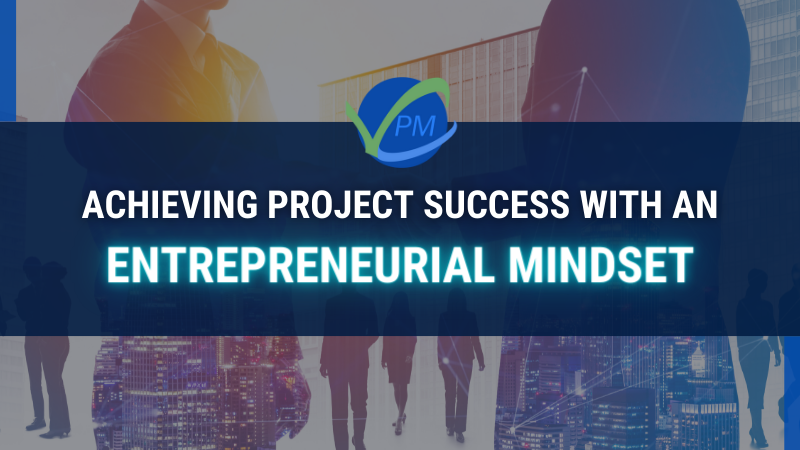
by DharamCW | Jun 12, 2022 | General
Two relevant quotes which quickly strike our minds when we think about the Entrepreneurial mindset are:
“Building a business is not rocket science; it’s about having a great idea and seeing it through with integrity.” Richard Branson
“At 211 degrees, water is hot. At 212 degrees, it boils. And with boiling water comes steam. And with steam, you can power a train.” S.L. Parker
Ideally, a project’s success is based on the critical success factors identified during the initial stages of the project, which would fall in various areas such as Process, Product, Project Management, Business, and Strategic. When the project can make a positive and long-standing impact on business value, a culture deeply imbibes into people’s minds. It creates an undeniable mark in the overall scheme of things.
Benefits and stakeholders’ satisfaction are the key factors that measure a project’s success. It’s also defined by the level of efficiency the project creates based on the set project objectives. Project success is based on the project success criteria and outcome. Typically, these criteria fall as Meeting the Scope identified, Deadlines and Milestones on time, Within the given budget, excellent satisfaction to the stakeholders, both internal and external, and with specified quality criteria.
Essentially, we all know that various tenets of project management contribute to success. Here, we will discuss how the entrepreneurial mindset would impact project success. Entrepreneurs have some unique characteristics such as being adaptive, decisive, risk-tolerant, persistent, able to handle failure, experimenting, building teams, etc.,
Mindset
One must believe that we can be malleable to unlock our growth as project managers or portfolio managers by transforming into an entrepreneurial mindset. We need to understand what mindset is, then understand the characteristics of an entrepreneurial mindset and how we can embark on that transformation journey from where we are to bring on project success in our project management career.
Mindset is an essential set of beliefs that provides a shape in terms of the view one has on the world and themselves. It influences how we think, act, feel and respond to a given situation. Typically, mindset falls into two categories as introduced by Carol S. Dweck, which we are all aware of: they are a) Fixed Mindset and b) Growth Mindset.
An entrepreneurial mindset is a growth mindset. Intelligence cannot be developed with a fixed mindset. A growth mindset is all about the belief that intelligence can be developed through personal effort, good learning strategies, and lots of mentoring and support from others. As introduced by Heider, the interpersonal process equation is a product of Ability, Motivation, and Environment.
An entrepreneurial mindset is a set of skills that allows people to recognize and capitalize on opportunities, overcome and learn from setbacks, and succeed amidst challenging backdrops. An entrepreneurial mentality is a method of thinking that helps achieve your business objectives. Entrepreneurs who learn from their mistakes and failures have a better chance of future success.
Entrepreneurs boost the economy by creating jobs and developing new products and services that benefit the entire world. A great entrepreneur must be able to think outside the box and come up with out-of-this-world ideas.
Entrepreneurial mindset and project management
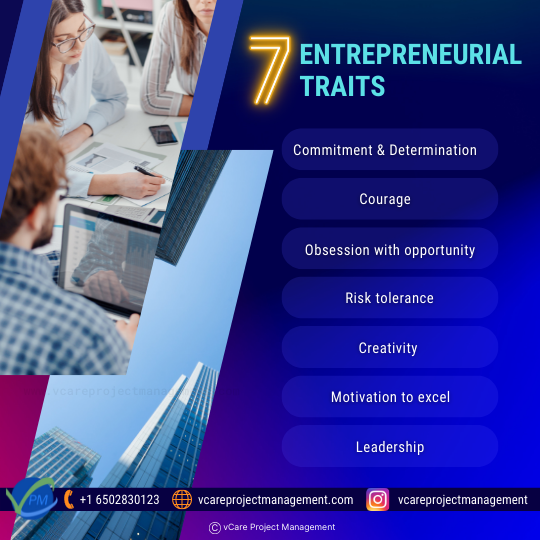
7 Entrepreneurial Traits
Though there is a common belief that entrepreneurship cannot be taught, and they should be born, studies have proven that it’s a myth. Typically, entrepreneurs search, seize and exploit the opportunities while mitigating them through engagement, courage, and perseverance. The following are the entrepreneurial traits that are generally encompassed in an entrepreneur:
- Commitment and Determination
- Courage
- Obsession with opportunity
- Risk tolerance
- Creativity
- Motivation to excel
- Leadership
An entrepreneurial mindset fosters more value for projects. Your project teams are encouraged to solve business problems and develop creative and innovative ideas. When a leader allows the teams to be creative and innovative, they will be more productive and engaged in the project.
The journal “People’s confidence in innovation” indicates that confidence in innovation is a component of the entrepreneurial mindset. In several ways, confidence in innovation can be considered part of the entrepreneurial mindset.
- First, entrepreneurs have more confidence in innovation than non-entrepreneurs.
- Second, confidence in innovation is positively related to other aspects of the entrepreneurial mindset, most notably self-efficacy, opportunity alertness, risk propensity, and role-modelling.
- Third, according to (Nochian and Schtt’s 2012) study, entrepreneurs are not like other people. Instead, their network appears to be the source of their confidence. In the same way, highly networked owners or managers are highly confident in innovation.
- Fourth, their innovativeness appears to be a result of their confidence. The more confident entrepreneurs are, the more innovative they are.
Entrepreneurial mindset and Project success
Commitment & Determination
Commitment and Determination would encompass Decisiveness, Tenacity, Discipline, persistence in solving problems, willingness to sacrifice, and being completely immersed in the mission. In the context of project management, each of these characteristics would contribute to the project’s success. For example, it is being decisive in terms of critical path challenges and exhibiting tenacity for unblocking issues without giving excuses for the need of the project and solving problems. Being committed requires a lot of sacrifice and discipline to bring on consistency. When being disciplined, it would require more like a parenting skill which would always course correct in the larger interest of the project, though seen to be tough externally. Discipline is brought about by establishing an unalterable set of rules and regulations to follow for the project’s success.
Courage
The definition of courage is “mental or moral strength to venture, persevere, and withstand danger, fear, or difficulty” (Mish, 1994, 266). Courage could be implemented with excellent values through moral strength, fearless experimentation, unafraid of conflicts, no fear of failure, and intense curiosity amidst facing risk. A courageous project manager would tackle the controversies and conflicts in the project early. A fearless project manager could put his job on the line in the pursuit of doing The Right Thing for the project. Often, the project manager would not have the necessary support and face active resistance, which needs to be managed with resolve to move beyond personal discomfort through intense curiosity.
Obsession about opportunity
An entrepreneur constantly looks for opportunities for improvement. Similarly, project managers consistently look for opportunities for improvement daily by observing day-to-day activities seeking to do more, do better, and do differently. Obsession with opportunity would be recurring, which would preoccupy or intrude on the project manager’s mind. This obsession would naturally shape the opportunity and help focus on project needs. Obsession with opportunities drives business value through the project.
Risk Tolerance
Good project managers would tolerate risk while being calculated risk-taker and risk sharers, thereby minimizing the risks. He would exhibit the characteristic of an entrepreneur by showing the ability to manage stress/conflict and ambiguity. Especially when the project has larger integrations and frequent changes would increase the ambiguity and uncertainty proportionally. Generally, the unknowns which are in the project would cause ambiguity. The ability to understand those would help identify the risks involved. PMBOK defines these areas in terms of Risk tolerance, Risk appetite, and risk threshold. It guides the management of these effectively through appropriate processes involving planning, controlling, and appropriate level of communication.
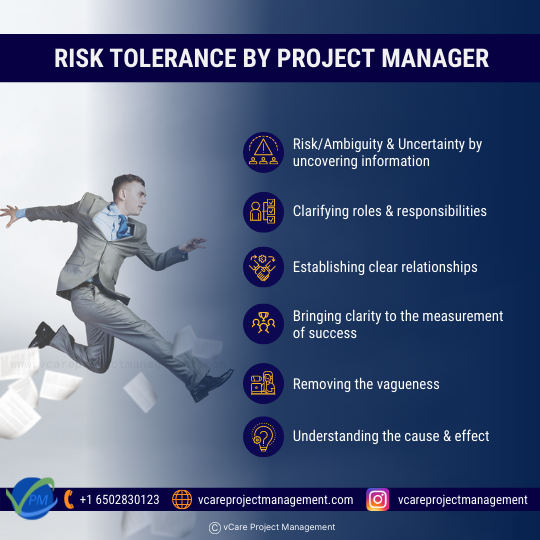
Risk Tolerance
Project managers should learn how to maneuver ambiguity. As ambiguity would be sinusoidal over time, it would arise and settle. The project manager must manage risk/ambiguity and uncertainty by uncovering information, clarifying roles and responsibilities, establishing clear relationships, bringing clarity to the measurement of success, removing the vagueness, and understanding the cause and effect.
Creativity
So what is creativity? In “The Social Psychology of Creativity,” Amabile (1983) defines creativity as,
“A product or response will be judged as creative to the extent that (a) it is both a novel and appropriate, useful, correct or valuable response to the task at hand, and (b) the task is heuristic rather than algorithmic” (p. 33).
Creativity can be multiple things. It would always push your limits by being open-minded, lateral thinking, ability to conceptualize by going into details, and ability to adapt. Creativity can be unleashed in project setup during Brainstorming sessions, Root Cause Analysis, Force field analysis, Affinity Diagrams, SWOT Analysis, etc. Creativity can be fostered further by open communication and providing an environment for the resources involved. As a project manager, one needs to remove the mental blocks like “Always looking for the right answer,” “avoiding ambiguity,” “I’m not creative,” “Always looking for concrete answers,” and “That’s not my area,” etc., Encourage creative aspects through “Why not like that,” “Let’s explore more,” “what value it would bring in,” etc.,
Motivation to excel
There is a popular phrase. Projects don’t succeed; people do. Typically the project’s success is always attributed to the people. People tend to have a goal and result orientation and need a self-imposed drive to achieve the results. Typically entrepreneurs keep motivating themselves and others around them despite all odds. People involved in projects need interpersonal support, understanding of weaknesses, and guidance to overcome them. Essentially aspects like having a sense of humor and perspective on the value they are adding to the project would motivate them to do better. The project manager’s responsibility is to understand individuals and adopt appropriate motivations strategy based on their needs, desires, and goals. They reward the team and its members creatively by recognizing their strengths. Make the project goals and success factors visible to the entire team. They are clarifying how the performance will be validated as an exact measure.
Leadership
Leadership is one of the essential traits entrepreneurs have. They would be self-starters and have a strong internal locus of control. Locus of control is the degree to which people believe that they, as opposed to external forces (beyond their influence), have control over the outcome of events in their lives. The concept was developed by Julian B. Rotter in 1954 and has since become an aspect of personality psychology. Project managers with an Internal Locus of Control believe that every event in their life derives from factors under their control. These individuals tend to blame or praise themselves for whatever success or failure they experiment in life. They would have enormous patience, integrity, and reliability. They would build teams and more leaders. Key attributes of communicating with a project management mindset include empathy, clarity, authenticity, and flexibility.
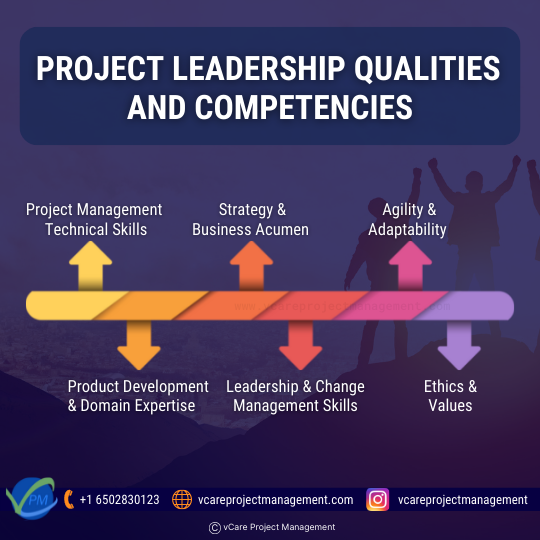
Project leadership qualities and competencies
Successful projects come as an outcome of a well-coordinated team effort. Project managers as leaders know their team very well.
The entrepreneurial mindset’s key aspects of a project’s success
Being confident and open-minded is crucial for a project professional with an entrepreneurial mindset. It’s about being self-assured, optimistic, and never afraid to take risks. Every day, if you have an entrepreneurial mindset, you will be ready to take action to achieve your goals and acquire project success.
While some scholars have examined aspects of the entrepreneurial mindset and provided general insights into its attributes, qualities, and operations, the question remains how people tap into it.
- The cognitive aspect—how do entrepreneurs use mental models to think?
- The behavioral aspect—how do entrepreneurs engage or act for opportunities?
- The emotional aspects—what do entrepreneurs feel in entrepreneurship?
Project leadership qualities and competencies
When the project requires success, both project managers and project sponsors should take up the role of a project leader by demonstrating leadership talents, competencies, and entrepreneurial mindsets. The following are the most significant features of effective project management:
- Project management technical skills
- Product development and domain expertise
- Strategy and business acumen
- Leadership and change management skills
- Agility and adaptability
- Ethics and values
Conclusion
The entrepreneurial mindset is an important factor leading to project success. Many leading authors agree with this point of view and are researching to substantiate this grounded theory. This endeavor to bring out the factors associated with the project manager’s leadership style profoundly impacts project success.
Feel free to check out my discussion on this topic with Thomas Walenta in YouTube
You can subscribe and follow my podcasts and interviews with Project Management Experts on YouTube at https://bit.ly/2NDY8wd
You can subscribe to vCare Project Management YouTube Channel to catch future videos of our certification Q&A series and student success stories using the link https://bit.ly/2YF0wJl
For any questions related to Project Management career, training, and certifications, you can book an obligation free 15 minutes session with me by visiting talktodharam.com
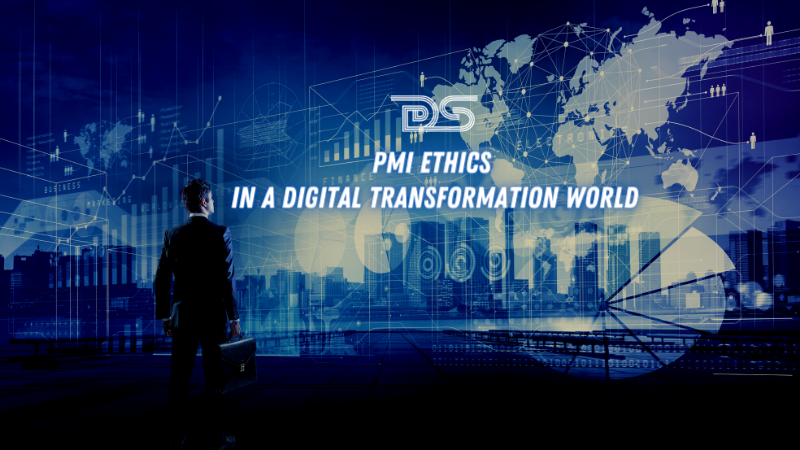
by DharamCW | Apr 20, 2021 | General
According to the PMI (Project Management Institute), “Ethics is about making the best possible decisions concerning people, resources and the environment. Ethical choices diminish risk, advance positive results, increase trust, determine long term success, and build reputations. Leadership is dependent on ethical choices”. Ethics represent a crucial differentiator in a highly competitive market where reputation and values are highly appreciated among the Project Management Professionals.
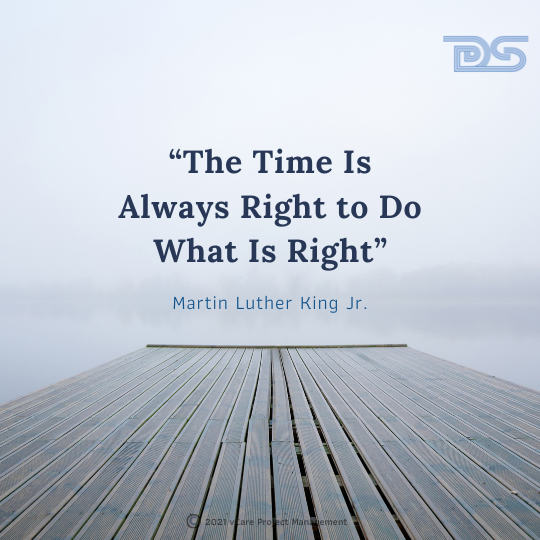
The Time Is Always Right to Do What Is Right
Martin Luther King Jr. said, “The Time Is Always Right to Do What Is Right”. As project managers/program managers or portfolio managers, we must make critical decisions daily. Though in the evolving digital transformation world, many decisions might go unnoticed, few do get noticed, as critical ones. These decisions have a profound impact on people, resources, and the environment. Some decisions might have led to conflicts, dilemma, or the creation of new risks.
What is Ethics, and what is the Role of PMI?
Ethics is the branch of knowledge that deals with moral principles. It involves steps, including systematizing, defending, and recommending concepts of right and wrong behaviours.
Regarding ethics at PMI, in the year 1981, the PMI team formed the PMI Board of Directors on Ethics, Standards, and Accreditation. The current PMI ethics document outlines the essentials of ethics based on Vision, Responsibility, Respect, Fairness, and Honesty. PMI expects its members to adhere to these codes of ethics to uphold its values.
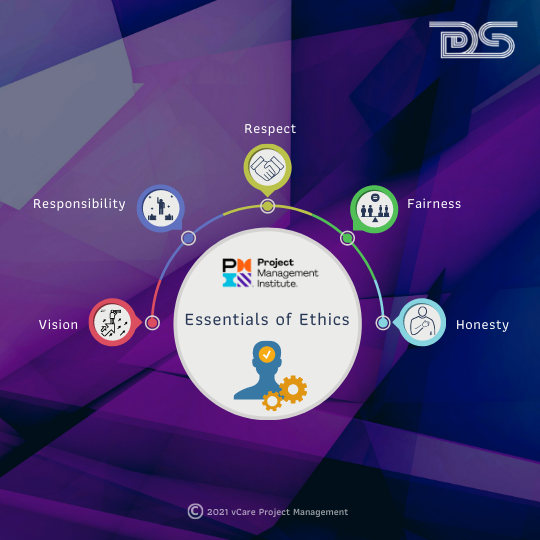
Essentials of Ethics
When the whole world is fighting the COVID-19 situation, and demand for digital transformation projects is at an all-time high, PMI professionals need not ask for a better time to establish high ethical standards. Let’s understand the key challenges a PMI trained professional faces in the current digital transformation world.
Digital Transformation
Digital transformation is the process of using digital technologies to create new — or modify existing — business processes, culture, and customer experiences to meet changing business and market requirements.
There are four types of digital transformation: business process, business model, domain, and cultural/organizational. We often see corporations focused solely on the process or organizational transformation.
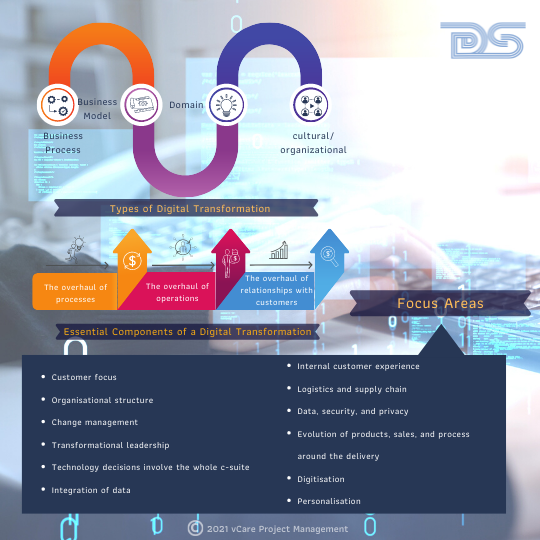
Digital Transformation
There are three essential components of a digital transformation:
- The overhaul of processes
- The overhaul of operations, and,
- The overhaul of relationships with customers.
The crucial elements that every digital transformation program needs to focus on are,
- Customer focus
- Organisational structure
- Change management
- Transformational leadership
- Technology decisions involve the whole c-suite
- Integration of data
- Internal customer experience
- Logistics and supply chain
- Data, security, and privacy
- Evolution of products, sales, and process around the delivery
- Digitisation
- Personalisation
The key aspects of the digital transformation world could have a major impact on Ethics.
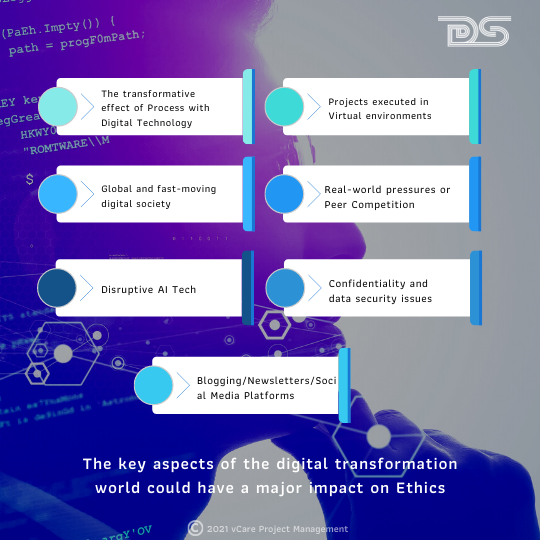
Major impact on Ethics
The transformative effect of Process with Digital Technology: Award-winning Author James Moor in 1985 mentions the transformative effect Digital Transformation could create. He cites the example transformation of manual votes to Electronic Voting Machines, which might benefit from speed and accuracy. On the contrary, it could impact security, vulnerability, transparency, and trustworthiness related issues.
Projects executed in Virtual environments: Today, the projects get implemented in remote places – Home/Office/Small Office combinations. People are working from remote, and it has become the new normal. People significantly use collaboration tools and in some occasions even communicate using social media, which could be manipulative.
Blogging/Newsletters/Social Media Platforms: Professionals tend to share the experience and insights reflecting upon the work ecosystem. Either sharing happens as an experience in a newsletter or a blog post, or it could be even a Twitter thread or a simple tweet reflecting a view. This act is typically done by those who tend to be expressive even within a professional organizational setup.
Global and fast-moving digital society: Communications spread very fast, and a diverse global culture leaves very little control. Digital technology, which is supposed to help leverage, could turn dangerous. The expectation for responsiveness sometimes leaves very little room for interpretation.
Real-world pressures or Peer Competition: Today’s real-world information sharing creates unwarranted peer pressure. This pressure might develop dilemmas and force individuals towards adverse decision-making. Sometimes, due to competitive peer pressures or financial pressures, even the employees’ health and safety concerns might get overseen.
Confidentiality and data security issues: Enhanced digital transformations across the globe have made data exchange easier. In the case of a data expose, it is vital to understand what is exchanged and what is the importance of the exchanged data. Lack of understanding of the data classification at appropriate levels could become risky when the proper accountability level could not be ascertained.
Disruptive AI Tech: Disruptive AI tech such as Chatbots, Speech Recognition Systems, etc., has made the way we think of data and decision making. Too much dependence or flawed inference might have an impact.
Ethics focus on PMIs Performance Domains & Digital Transformation
When a portfolio/program/project vision is established and defined, observable outcomes between the current state and future state as part of the digital transformation must be counted in. The key components that would impact the above said performance domains would be done with re-imagination, cultural change, and cross-functionality.
Digital transformation might have changed in a newer business model, new product focus, and a more contemporary way of working. Digital transformation is about getting the technology right and building necessary support and buy-in from the people managing resistance. Business processes need to be horizontally redesigned to enable collaboration across the teams.
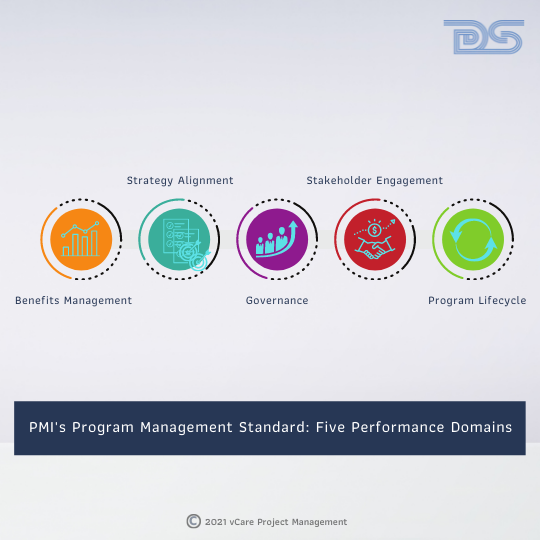
PMI’s Program Management Standard
PMI’s Program Management Standard defines five performance domains that can be integrated with ethics, giving a significant shift in ethics adoption, and may help in improving overall digital transformation initiatives. They are:
- Benefits Management: Benefits profile, which would be based on outcomes and measurement, has to have the ingredients of the ethics as well.
- Strategy Alignment: Strategic alignment to focus on the changing business environment and strategic targets on digital transformation must be governed through ethics.
- Governance: Governance focus and establishes control related to programs. Governance would bring discipline and ethics into the broader organizational structure.
- Stakeholder Engagement: Stakeholders to be kept well informed on the ethical aspects of getting involved whenever any changes in stakeholders.
- Program Lifecycle: Given a structure and suggested flow for a program, the ethics principle has to be adopted to address dilemmas related to circumstances of a business and initiative.
5As Decision-Making framework
PMI has recommended the 5A’ss decision-making framework outlines with Assessment-Alternatives-Analysis-Application-Action. The 5A’s assessment helps to collate all the facts about the ethical dilemma. It considers all your choices. Subsequently, decision candidates are identified and tested for their validity. Apply these principles to the candidates and make the final decision.
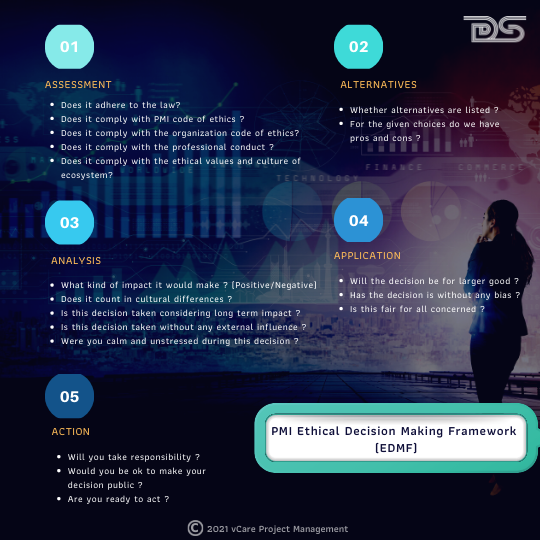
5As Decision-Making framework
The decision-makers, when they adopt the 5A decision-making framework, the following checklist:
Assessment
- Does it adhere to the law?
- Does it comply with PMI code of ethics ?
- Does it comply with the organization code of ethics?
- Does it comply with the professional conduct ?
- Does it comply with the ethical values and culture of ecosystem?
Alternatives
- Whether alternatives are listed ?
- For the given choices do we have pros and cons ?
Analysis
- What kind of impact it would make ? (Positive/Negative)
- Does it count in cultural differences ?
- Is this decision taken considering long term impact ?
- Is this decision taken without any external influence ?
- Were you calm and unstressed during this decision ?
Application
- Will the decision be for larger good ?
- Has the decision is without any bias ?
- Is this fair for all concerned ?
Action
- Will you take responsibility ?
- Would you be ok to make your decision public ?
- Are you ready to act ?
Benefits:
When the portfolio managers and program managers adopt the above-said approach outlined in the PMI code of ethics, it provides the following benefits:
- Elevates the profession and raises future standards
- Increases the faith and trust among peers
- Imprints on individual moral mindsets and behaviors
- Improves business relationships across the board
- Promotes fair decision making
- Reduces project risks
- Reduces anxiety and stress and ultimately turnover in projects
Conclusion
Transparency and integrity must be the core values which has to be established by the professionals. The data must be used in responsible and ethical ways during the digital transformation initiative. Data collection has to be based on the ethics principle called “Informed Consent.” The actions cannot be intrusive, manipulative, or disrespectful to others.
Trust must be established among the individuals, groups, or organizations involved in the digital transformations. This trust can be created by establishing data provenance, traceability from the source to the user interface. Program managers or portfolio managers have to act without any bias and with a high level of integrity and impartiality. The same has to be established for the clients, suppliers, and subcontractors without any favoritism and giving them an unfair advantage.


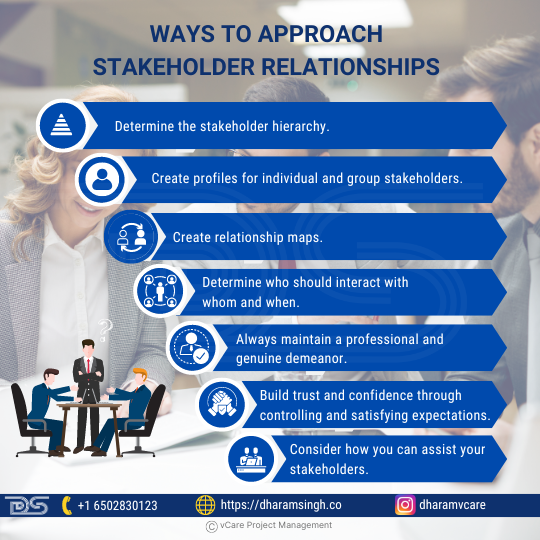



















Recent Comments